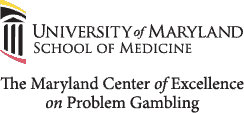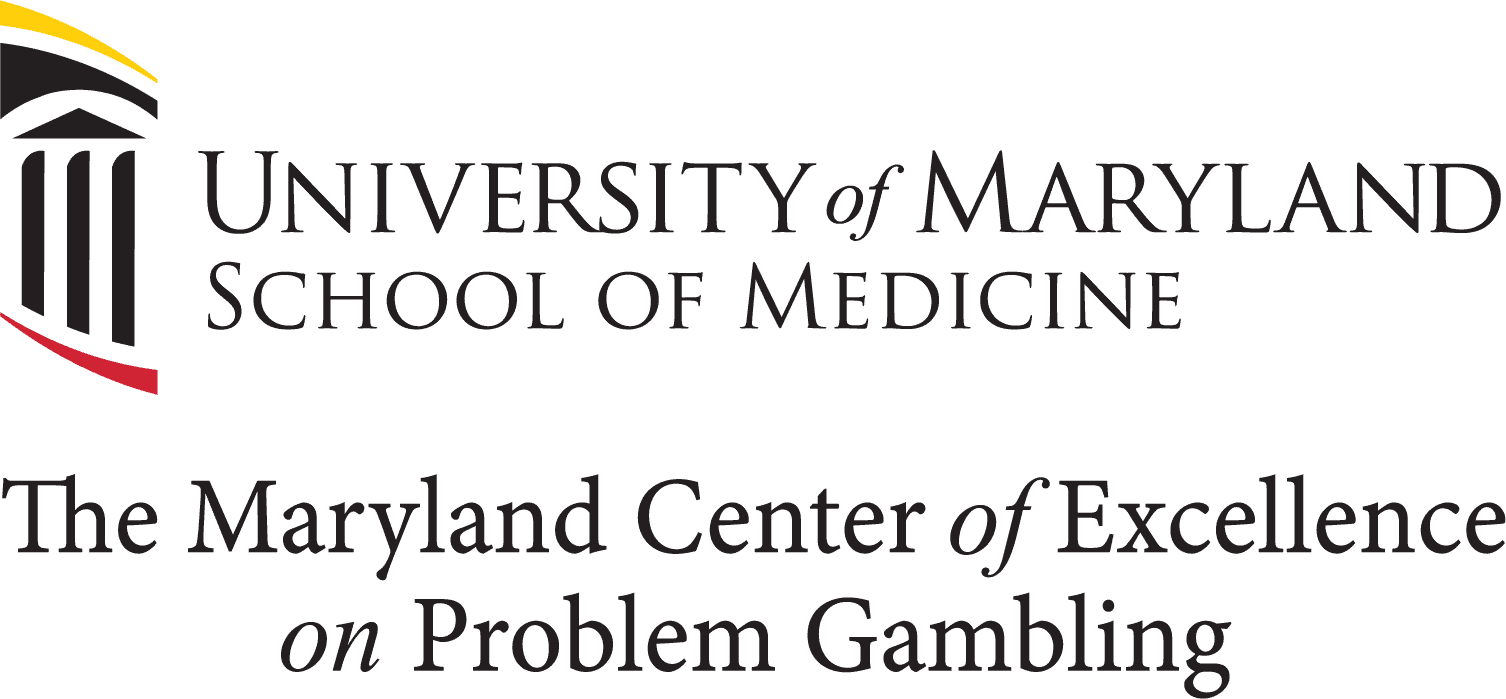We invite you to join us for 2017-2018 series of free webinars designed to provide additional problem gambling clinical training on a variety of topics. One (1) CEU will be offered for each webinar. All webinars are one (1) hour, 12:00-1:00 PM EST.
These webinars are presented by:
– Lori Rugle, PhD, ICGC II, BACC – Program Director, Maryland Center of Excellence on Problem Gambling
-Jeffrey M. Beck, LPC, ICGC II, JD, CART, MTC, ABD – Clinical Director, Maryland Center of Excellence on Problem Gambling
-Carl Robertson, MRE, MDiv – Prevention Manager, Maryland Center of Excellence on Problem Gambling
Friday, September 22, 2017
“What Does Recovery Look Like for an Individual with Gambling Disorder”
CLICK HERE TO VIEW POWERPOINT
Learning Objectives: Attendees should be able to:
-Define and differentiate between a recovery promotion and relapse prevention perspective.
-Present an empowerment model that supports client goals and multiple pathways to recovery.
-Discuss systems and personal change needed for transformation at all levels to a recovery oriented system of care.
Friday, October 27, 2017
“Screening for Gambling Problems”
CLICK HERE TO VIEW POWERPOINT
Learning Objectives: Attendees should be able to:
-Identify the need and rationale for screening for gambling problems in a range of health care settings.
-Gain an understanding of how to utilize effective brief problem gambling screening strategies.
-Identify how to develop a problem gambling integrated intake.
Friday, November 17, 2017
“Problem Gambling Assessment”
CLICK HERE TO VIEW POWERPOINT
Learning Objectives: Attendees should be able to:
-Identify at least three methods to assess problem gambling severity.
-Identify how to assess for legal and financial problems in individuals presenting with gambling disorder.
-Assess for subtypes of problem gamblers.
Friday, December 15, 2017
“How to Engage Clients with Gambling Disorder in Treatment”
CLICK HERE TO VIEW POWERPOINT
Learning Objectives: Attendees should be able to:
-Identify strategies to address issues of shame and stigma among clients with gambling disorder.
-Identify common concerns of gambling clients that can be used to increase motivation to engage in treatment.
-Identify motivational strategies to engage and maintain clients with gambling disorder in treatment.
Friday, January 26, 2018
“Responsible Gambling Practices for the Individual/ For the Broader Community”
CLICK HERE TO VIEW POWERPOINT
Learning Objectives: The Maryland Lottery and Gaming Agency is committed to the practice of Responsible Gambling. Moderated by the Responsible Gambling Coordinator for the Maryland Lottery, this presentation will define the concept of Responsible Gambling and what that means for individuals and communities. Key elements of the Maryland Lottery and Gaming Agency’s Responsible Gambling program will be described including: Responsible Gambling training for casino, lottery and bingo staff as well as lottery retailers, responsible advertising, the Alliance for Responsible Gambling and the Voluntary Exclusion Program.
Learning Objectives: Attendees should be able to:
-Define responsible gambling and the key elements of a responsible gambling code of conduct.
-Gain an awareness of the Maryland Lottery and Gaming Agency’s Responsible Gambling activities.
-Describe how Maryland’s Voluntary Exclusion Program (VEP) functions and how individuals can enroll.
Friday, February 23, 2018
“Have the Conversation: Problem Gambling Awareness Month Planning”
CLICK HERE TO VIEW POWERPOINT
Learning Objectives: Participants will explore basic communication strategies on how to engage community members, health care professionals and special populations into conversation using the theme of gambling. Attendees should be able to:
-List the different activities that may be defined as ”gambling” that are available to all age groups.
-Understand the risks and identify some of the warning signs that may be associated with gambling.
-Learn five (5) talking points that can be incorporated into conversation around the topic of gambling in a safe and respectful manner with the general public and with clients.
-Implement conversation strategies for talking with special populations, e.g., youth, older adults.
-Create a gambling and problem gambling awareness activity plan to implement within their own communities.
Friday, March 30, 2018
“Harm Reduction and Gambling Disorder”
CLICK HERE TO VIEW POWERPOINT
Learning Objectives: Attendees should be able to:
-Identify at least two (2) strategies for using limited gambling as a treatment goal for clients.
-Identify key elements for using harm reduction in the treatment of problem gambling.
-Describe family involvement strategies when working on limited gambling and harm reduction strategies in the treatment of problem gambling.
Friday, April 27, 2018
“Treatment Planning with Gambling Disordered Clients”
CLICK HERE TO VIEW POWERPOINT
Learning Objectives: Attendees should be able to:
-Use ASAM guidelines for developing a problem gambling treatment plan.
-Understand how to incorporate financial issues into a problem gambling treatment plan.
-Develop a collaborative, goal oriented treatment plan.
Friday, May 25, 2018
“Gambling Problems Among Individuals with Serious Mental Illness”
CLICK HERE TO REGISTER
Learning Objectives: Attendees should be able to:
-Identify the impact of gambling among individuals diagnosed with serious mental illness.
-Identify at least three common perceived benefits of gambling for individuals with serious mental illness.
-Identify treatment approaches to address gambling problems among those with serious mental illness.
Friday, June 29, 2018
“Youth and Problem Gambling”
CLICK HERE TO REGISTER
Learning Objectives: Youth problem gambling has similarities and differences to adult problem gambling. This webinar will provide participates with an understanding and knowledge related to the prevalence of youth gambling in Maryland; reasons why youth gamble; and resources available to address youth problem gambling in communities. Attendees should be able to:
-Contracts the prevalence rates of youth and adult problem gambling in Maryland.
-Describe the three (3) reasons why youth gamble.
-Identify a Maryland resource for addressing youth gambling awareness in local communities.




